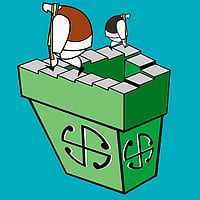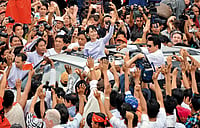The claim that “the best thing” about the Bangladesh Jamaat-e-Islami is that it did not kill Hindus “simply because of their faith” but only targeted them as political adversaries “owing allegiance to the Awami League” is astounding (S.N.M. Abdi, The Monster Breathes Air, Mar 18). As if a secular political murder is better than a communal one. Political murder is as despicable because it runs counter to the grain of democratic politics. This is the first questionable assumption in Abdi’s analysis of the Jamaat-e-Islami. Second, having elevated the Jamaat to a dubious respectability because it doesn’t kill Hindus for their religion, he argues that India must deal with them diplomatically because its members are not “sworn enemies of India or Hindus”. In effect, he assumes that India’s foreign policy is dictated by Hindu interests.
India is bigger than the sum total of its Hindu population. It is not a Hindu nation and is not in the business of promotion and protection of Hinduism. There is no Hindu ‘umma’ (brotherhood). There are, however, international conventions and covenants on human rights, religious freedom etc which India along with every other civilised nation supports. To suggest that India’s foreign policy should be based on how Hindus are treated in a particular country—be it Fiji, Indonesia, Mauritius, Bangladesh or Pakistan—is ludicrous.
Third, Abdi projects the Jamaat as a flexible organisation, ever ready to change and adapt, ostensibly demonstrated by deleting the “rule of Allah” in its political charter. This, as he admits, was done on the ‘prodding’ of the Bangladesh Election Commission. However, the constitution of the Jamaat still declares its goal to be "establishing rule of Allah on every nook and corner (sic) of the person, family, society and the state" (http://www.jamaat-e-islami.org/en/aboutus.php). Abdi seems to have taken the change in the charter of registration as proof of a genuine change of ideology, forgetting the old adage, ‘All warfare is based on deception’. Doesn’t the RSS claim that it is a ‘cultural organisation’ while appointing the top political functionaries of the BJP?
Fourth, for Abdi, the progressive credentials of the Jamaat are further established by its promise of 33 per cent reservation for women in the legislature. This, he says, should please the “Hindutva poster girls like Sushma Swaraj, Shaina Chudasama, Nirmala Sitharaman, Smriti Irani and Meenakshi Lekhi” of the BJP. The demand for women’s reservation in India is not limited to any one political party. His gratuitous abuse of the BJP adds nothing to understanding the communal character of the party and doesn’t bolster his secular credentials. Cheap abuse, especially against women in public life, is unacceptable and Abdi should not expect his friends—I am one of them—to stand by and applaud.
Fifth, Abdi assumes that it would be productive for India to engage the Jamaat in a dialogue. He does not say what would be the aim of engaging with an organisation which participated in the genocide in 1971. Though not all the three million people killed then were murdered by the Jamaat, it has not renounced either violence or its actions of 1971. Although politics is the art of the possible, there are red lines which are not crossed even in that most public of arenas.
These outlandish suggestions follow from Abdi’s acceptance of the Jamaat’s reinvented narrative of itself. In doing so, he ignores the counter-narrative which most Bangladeshis—and others concerned with the spread of Islamist fundamentalism—believe.
The Jamaat as an organisation, led by radical clerics, wants to create an Islamic state there. It regrets the formation of Bangladesh and collaborated with the Pakistan army in hunting down and killing fellow citizens. Its leaders stand accused of rape, murder and arson. Even today, the Jamaat dreams of a ‘neo-Pakistan’ and along with its allies, the Islamic Okiya Jote and the Bangladesh National Party (BNP), wants to “revive the spirit of 1947” when the Partition of India took place based on the two-nation theory, “restore Islamic values” and bring Bangladesh “out of Indian domination”.
During 1971, the activists of the Jamaat’s student wing, Islami Jamiat-e-Talaba and Islami Chhatra Sangha (now, Islami Chhatra Shibir), actively helped the Pakistan army set up militias to hunt down freedom fighters. Matiur Rahman Nizami, later to become a minister in Khaleda Zia’s government, led a ferocious militia called Al Badr—its death squads specialised in killing prominent intellectuals and activists. This is the organisation which Abdi seeks to adorn with respectability and provide the oxygen of legitimacy.


























